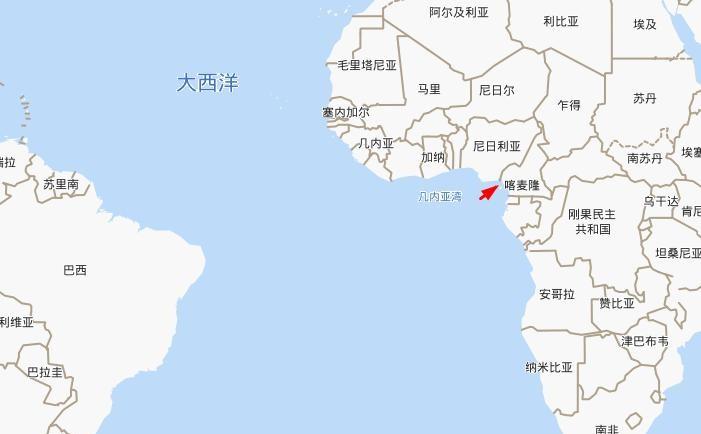Cameroon is located in central Africa, bordering the Gulf of Guinea to the southwest, with a total area of 475,000 square kilometers. Worldwide, Cameroon is not small, but it is mainly inland, the coastline is not long, and strictly speaking, Cameroon's coastline does not face the Atlantic Ocean.

As can be seen from the map, the coastlines of most countries in west Africa face the Atlantic Ocean, including the Gambia, the Democratic Republic of the Congo, which has a short coastline, and also directly faces the Atlantic Ocean. Cameroon's offshore region, on the other hand, has a large island, which imposes certain restrictions on Cameroon's access to the sea.
The island, called Bioko Island, covers an area of 2,017 square kilometers and is the largest island in the Gulf of Guinea. Bioko Island is the closest country on the African continent to Cameroon, with a straight-line distance of only about 50 kilometers, which can be said to be in cameroon's offshore area. It is followed by Cameroon's northern neighbor Nigeria, about 100 km from Bioko Island, and finally equatorial Guinea on the African continent in southern Cameroon, about 160 km from Bioko Island.
Although Bioko Island is the closest to Cameroon, the island does not belong to Cameroon, but to Equatorial Guinea, which limits the size of Cameroon's territorial waters and the problem of access to the sea. Moreover, at the end of the last century, rich oil resources were also found in the waters of Bioko Island, and Equatorial Guinea achieved rapid development by relying on oil exports.
Prior to the discovery of oil, Equatorial Guinea's economy was dominated by crops and heavily dependent on agricultural exports, and its economy was very backward, and its standard of living was not as good as that of Cameroon. But after the discovery of oil in the waters off Bioko Island, Equatorial Guinea has left Cameroon far behind, and now Equatorial Guinea's per capita GDP has reached ten thousand US dollars, and Cameroon has only more than 1,000 US dollars, so it can be said that Bioko Island is an island that has reversed equatorial Guinea's backwardness. If the island belongs to Cameroon, the economy of Cameroon will also develop rapidly, the territorial sea area will expand, and access to the sea will not be restricted, so why does Bioko Island not belong to Cameroon?
In fact, Cameroonians often have this question, why does such an important island not belong to them? This also begins with the colonial era. Before the colonial era, sub-Saharan Africa had basically no formal state, and now these African countries, and their borders, are born out of Western colonization. That is to say, in the long history of Africa, there has been no Cameroon at all, no Equatorial Guinea, and only tribes living in these areas.
These tribes living in Cameroon, with a very low level of productivity, mainly hunting for a living, have no will or strength to control the islands on the sea, and it is possible that they are not aware of the existence of Bioko Island. It was not until the beginning of the colonial era that the Portuguese first occupied the island of Bioko, as well as the islands of Corisco and Annoben to the south of bioko island. These islands are located off the coast of what is now Cameroon, which is a constraint on Cameroon's access to the sea. At that time, the purpose of the Portuguese occupation of these islands was also to use them as a base to colonize the African continent.
Later, with the expansion of Spain and Portugal, there were some disputes in South America, and in order to establish a colonial base in Africa, Spain exchanged part of the land in South America with Portugal for the islands of Bioco, Corisco and Annoben. At that time, the time was 1778, and the division of Africa by European countries was already fierce, and although Spain occupied these islands, the African continent was basically divided. Britain occupied Nigeria, France occupied West Africa, Germany occupied Cameroon, leaving Spain with few opportunities.
This made Spain and Africa anxious, and if it did not occupy the land on the African continent, the purpose of exchanging land with Portugal would not be achieved. In order to gain a place nearby, Spain took up a very barren piece of land in southern Cameroon, making it an angle with the islands of Bioko, Korysco, Annoben and so on. These lands merged to form the colony of Spanish Guinea, later Equatorial Guinea.
After the end of the colonial era, Equatorial Guinea and Cameroon gained independence respectively, and Bioko Island naturally belonged to Equatorial Guinea. Since Bioko Island was the base of Spanish colonization of Equatorial Guinea, it developed earlier and more perfectly, and after equatorial Guinea became independent, it set its capital in Malabo on bioko Island, focusing on controlling the island. Half of Equatorial Guinea's population now lives on Bioko, especially after the discovery of oil in 1991, underscoring its importance. It can be seen that although Bioko Island is very important, has oil, and also limits the territorial sea area of Cameroon, as well as the problem of going to sea, the island did not belong to Cameroon at the beginning, and never belonged to Cameroon, so Cameroon's mentality can only be described as helpless.